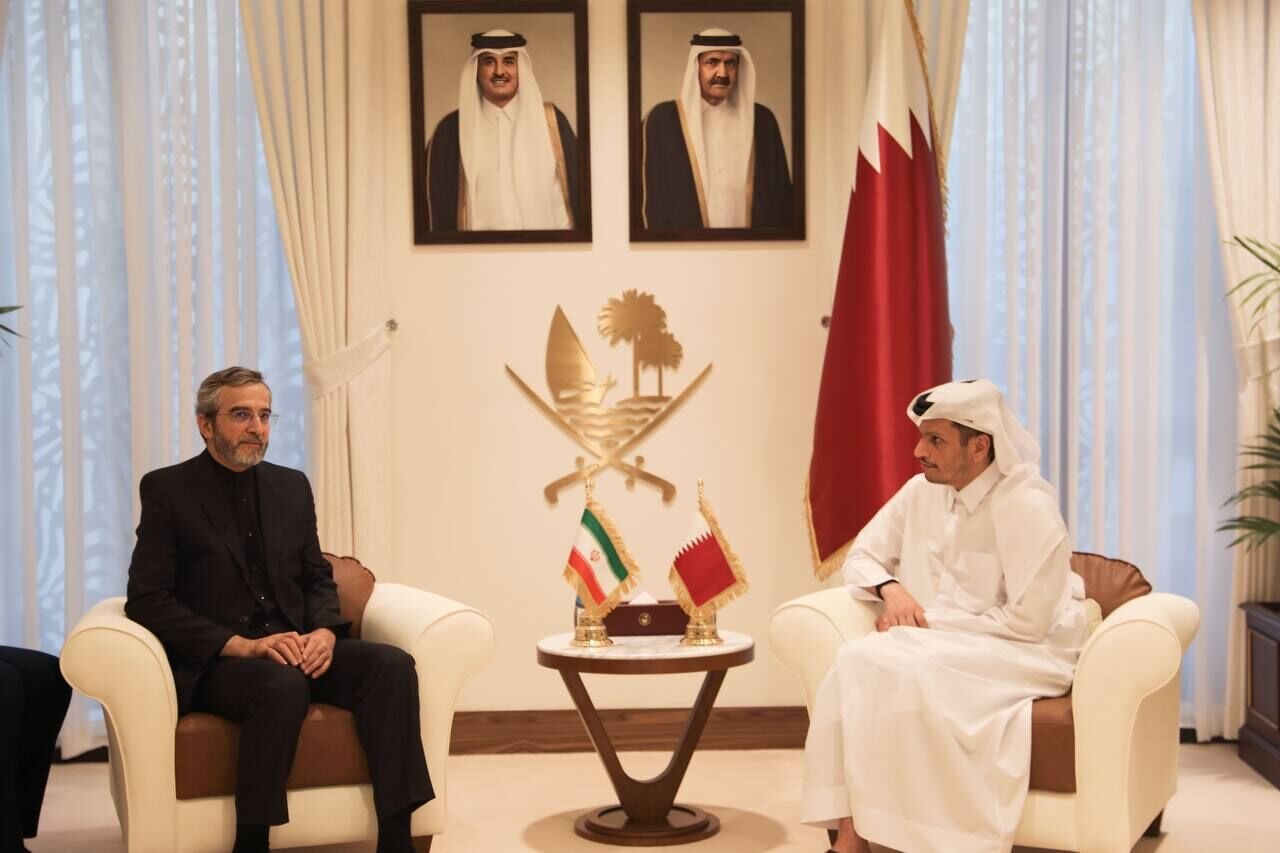Iran, Qatar vow to strengthen ties, end Israeli crimes in Gaza

TEHRAN – Iran's acting Foreign Minister Ali Baqeri Kani has lauded the burgeoning political and economic relations between Iran and Qatar, emphasizing the Islamic Republic’s strategic policy of fostering strong ties with neighboring countries.
This announcement came during a meeting with Qatar’s Foreign Minister Sheikh Mohammed bin Abdulrahman Al Thani in Doha on Wednesday night.
Baqeri Kani highlighted the recent visit of a high-ranking Qatari delegation to Tehran, which aimed to pay tribute to the late President Ebrahim Raisi and offer condolences to the Iranian government and people. He described this gesture as a symbol of the deep and growing bonds between the two nations.
The Iranian diplomat praised the positive state of Iran-Qatar relations across various political and economic sectors, underscoring the effective roles of Raisi and the late Foreign Minister Hossein Amir Abdollahian in establishing long-term and stable bilateral relations.
He reiterated Iran's strategic policy of strengthening relationships with its neighbors, stating, “The neighborliness policy of Raeisi's government has become the rallying call of all parties seeking security and sustainable development. This strategic priority of the foreign policy of the Islamic Republic of Iran will undoubtedly continue unabated.”
Baqeri Kani also addressed the ongoing Israeli offensive on the Gaza Strip, urging the use of all available capacities to end what he described as genocide and support the oppressed population of Gaza. He called for a collective regional effort to alleviate the humanitarian crisis and stabilize the region.
The Qatari Foreign Minister, who also serves as Prime Minister, paid tribute to the late Iranian leaders, acknowledging their significant contributions to the enhancement of Doha-Tehran relations and their support for Palestine.
He described the current regional situation, particularly in Gaza, as “very dangerous” and emphasized the importance of continuous Iran-Qatar consultations to ensure regional stability and security.
The conflict in Gaza has seen a catastrophic toll, with Israeli actions since October 7 resulting in the deaths of at least 37,396 Palestinians, mostly women and children, and injuries to 85,523 others.
Baqeri meets with the head of political bureau of Hamas
In a related diplomatic development, Baqeri Kani met with Ismail Haniyeh, head of the political bureau of Hamas Resistance Movement, in Doha on Thursday.
During this meeting, Baqeri Kani underscored the necessity for Palestinian Resistance groups to leverage all capacities to impose a higher cost on Israel for its aggression in Gaza. He argued that Resistance should encompass not only armed struggle within Palestine but also legal, political, and public diplomacy efforts outside the occupied territories to advocate for Palestinian rights.
Baqeri Kani praised the resilience of the Palestinian people and outlined Iran's ongoing political efforts to support their cause.
Haniyeh expressed gratitude for the support from Iran's leadership and nation, noting the continued strong resistance of Palestinians against Israeli actions despite the severe ongoing conflict in Gaza.
Haniyeh highlighted significant regional and global developments, including Israel’s internal political turmoil, shifts in its regional and international standing, increased public opposition in the West and the U.S. to Israeli policies, and significant developments in Lebanon and Yemen. He emphasized that these changes indicate a "strategic maturity" among regional nations and the impossibility of returning to pre-Operation Al-Aqsa Storm conditions.
Nearly nine months into the extensive military aggression against Gaza, Israeli forces have failed to achieve their objectives, Haniyeh asserted, expressing Hamas' openness to any mechanism that meets all Palestinian demands. The Israeli offensive, which began following a surprise attack by Palestinian resistance groups on October 7, has led to widespread devastation, targeting hospitals, residences, and places of worship, resulting in over 37,431 Palestinian deaths and 85,653 injuries, and displacing more than 1.7 million people.
The Gaza Government Media Office has issued warnings about the severe lack of aid, including food, nutritional supplements, and vaccines, which puts 3,500 children at risk of dying from malnutrition.
The offensive has severely crippled Gaza's health sector. According to Gaza’s Health Ministry, the conflict has reduced the enclave’s clinical capacity by 70 percent. Consequently, Gaza is increasingly relying on field hospitals, which often lack basic services, to treat patients who cannot find spots in the remaining hospitals.
This dire situation highlights the urgent need for international intervention to address the humanitarian crisis and bring an end to the violence affecting countless innocent lives.
